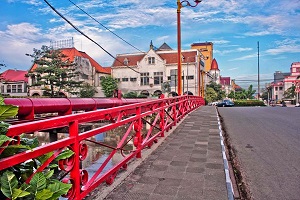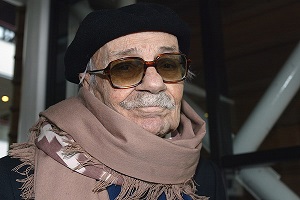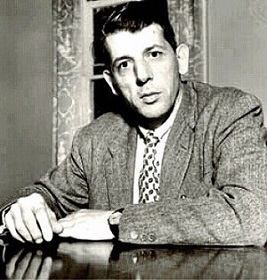De Nederlandse dichter Wilfred Smit werd geboren in Soerabaja (Java, Nederlands Indië) op 24 juni 1933. Zie ook alle tags voor Wilfred Smit op dit blog.
Parabel
Zo zag ik een erwt weifelen
aan een stoeprand,
de erwtenbloesem onzeker zijn
naar welke wind
haar dolle rose hoofd te hangen –
en de bloesem nikte, er kwam een hand
in handschoen haar bedekken,
en de erwt viel, er kwam een schoen
om op haar te staan.
Stilleven
Twee harten op een schotel
met glimlichten van droefenis,
een aarden kruik waaruit
de geest staat te verwaaien,
wat klein rood fruit
dat deze noen gevallen is
maar nooit de grond bereikte –
en de tuinier was daarbij als fazant
verbeeld, het schot hoog aan de hals;
dit is om aan mijn vriendin te geven,
een aansporing tot stiller leven.
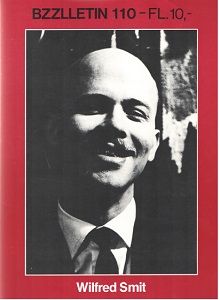
De Nederlandse schrijver en televisiemaker Matthijs Leonard Kleyn werd geboren in Leiden op 24 juni 1979. Zie ook alle tags voor Matthijs Kleyn op dit blog.
Uit: Ik zie je
“Als ik het terras op loop, zit ze aan een lange tafel. Ik loop erheen en ga naast haar zitten. Ze negeert me. Een meisje dat tegenover haar aan tafel zit, kijkt me verbaasd aan.
‘En jij bent?’ vraagt ze.
‘Fender.’ Ik steek mijn hand uit.
‘O, grappige naam. Ik ben Frida,’ zegt ze tijdens het schudden.
‘Frida de kunstenares of Frida van ABBA?’
‘Frida van ABBA,’ antwoordt Frida.
‘Dat is volgens mijn vader ook een kunstenares. Kunnen we je ergens mee helpen?’
‘Nee, ik ga zo naar de film. Die film is nog niet begonnen, want die begint niet op een terras.’
Onder de tafel wordt mijn pink geaaid. Ik vermoed dat het haar pink is waarmee ze de mijne streelt, maar het zou ook haar wijsvinger kunnen zijn. Of haar duim. Haar handen zijn te klein om me voor te kunnen stellen hoe ze voelen. Ze kijkt me weer aan door de glazen van haar zonnebril.
‘Hoelang duurt het nog voor de film begint?’ vraagt ze zacht naast me.
‘Niet zo heel lang meer,’ zeg ik.
‘En waar gaat die over?’
‘Over een jongen en een meisje die iets bij elkaar vinden wat ze nooit eerder hebben gevonden.’
‘Klinkt cliché.’
‘Maar dat is het niet. Want aan deze twee mensen is niets cliché. Deze horen bij elkaar in al hun gektes.’
‘Loopt de film goed af?’
‘Dat weet ik niet, ik heb ’m nog niet gezien. Maar ik denk het wel. Want we houden allebei niet van films die niet goed aflopen, dus we zullen er alles aan doen.’
‘Sorry,’ zegt Frida, ‘maar kennen jullie elkaar?’
‘Ja,’ antwoordt ze terwijl ze haar zonnebril afdoet, ‘maar het lijkt alsof hij me niet wil leren kennen. Hij reageert niet eens als ik hem op een vol terras sms.’
De trilling die ik wilde negeren.
‘Hoe kom je aan mijn nummer?’ vraag ik.
‘Van die lelijke website van die op sterven na dood zijnde videotheek van je.’
‘Sta ik zo ook in je telefoon? Als de jongen van de op-sterven-nadoodvideotheek?’
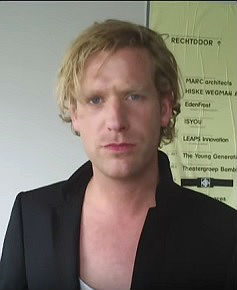
De Argentijnse schrijver Ernesto Sabato werd op 24 juni 1911 geboren in Rojas, een dorp in de provincie Buenos Aires. Zie ook alle tags voor Ernesto Sabato op dit blog.
Uit: Maria oder die Geschichte eines Verbrechens (El túnel, vertaald door Helga Castellanos)
“Es wird genügen, wenn ich erwähne, dass ich Juan Pablo Castel bin, der Maler, der María Iribarne umgebracht hat. Ich nehme an, dass der Prozess noch allen in Erinnerung ist und dass zu meiner Person keine näheren Erklärungen erforderlich sind.
Obwohl nicht einmal der Teufel weiß, woran sich die Leute erinnern, geschweige denn, warum. Es ist so, dass ich immer gedacht habe, es gäbe kein kollektives Erinnerungsvermögen, was vielleicht eine Art Verteidigung des Menschengeschlechts ist. Der Satz »Früher war alles besser« weist nicht darauf hin, dass früher weniger Schlechtes geschah, sondern dass – glücklicherweise – die Leute das Schlechte vergessen. Selbstverständlich hat ein solcher Satz keine Allgemeingültigkeit. Ich zum Beispiel zeichne mich dadurch aus, dass ich mich vorzugsweise an alles Schlechte erinnere, und so könnte ich fast sagen, dass »früher alles schlechter war«, wenn es nicht so wäre, dass mir die Gegenwart genauso entsetzlich vorkommt wie die Vergangenheit. Ich erinnere mich an so viel Unheil, an so viele zynische und grausame Gesichter, an so viele schlechte Taten, dass die Erinnerung daran für mich wie das zaghafte Licht ist, das ein dreckiges Museum der Scham beleuchtet. Wie oft habe ich mich Stunde um Stunde in eine dunkle Ecke meines Ateliers verkrochen, wenn ich eine Nachricht in der Spalte der Polizeiberichte gelesen hatte! Aber es ist ja so, dass dort nicht immer die schändlichsten Taten der Menschheit aufgeführt werden. Bis zu einem gewissen Punkt sind Verbrecher eher saubere, eher harmlose Menschen. Diese Behauptung stelle ich nicht auf, weil ich selbst einen Menschen getötet habe. Nein, es ist meine ehrliche und tiefe Überzeugung. Ein Individuum ist schädlich? Dann wird es eben beseitigt, und fertig. Das ist das, was ich eine gute Tat nenne. Denken Sie einmal, wie viel schlechter es für die Gesellschaft ist, wenn dieses Individuum sein Gift weiterhin verspritzt und wenn man, statt es zu beseitigen, seinem Treiben dadurch Einhalt gebieten will, indem man sich in die Anonymität flüchtet, in üble Nachrede und ähnliche Gemeinheiten. Was mich angeht, so muss ich bekennen, dass ich es heute bedauere, die Zeit meiner Freiheit nicht besser genutzt und sechs oder sieben Typen, die ich kenne, nicht beseitigt zu haben.“
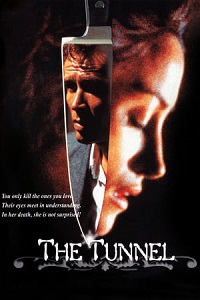
Affiche voor de film « The Tunnel” uit 1988
De Franse dichter, schrijver en vertaler Yves Bonnefoy werd in Tours geboren op 24 juni 1923. Zie ook alle tags voor Yves Bonnefoy op dit blog.
Phénix
L’oiseau se portera au-devant de nos tètes,
Une épaule de sang pour lui se dressera.
Il fermera joyeux ses ailes sur le faîte
De cet arbre ton corps que tu lui offriras.
Il chantera longtemps s’éloignant dans les branches,
L’ombre viendra lever les bornes de son cri.
Refusant toute mort inscrite sur les branches
Il osera franchir les crêtes de la nuit.
Cette pierre ouverte est-ce toi, ce logis dévasté,
Comment peut-on mourir ?
J’ai apporté de la lumière, j’ai cherché,
Partout régnait le sang.
Et je criais et je pleurais de tout mon corps.
Sur une pietà de tintoret
Jamais douleur
Ne lut plus élégante dans ces grilles
Noires, que dévora le soleil.
Et jamais Élégance ne lut cause plus spirituelle.
Un feu double, debout sur les grilles du soir.
Ici,
Un grand espoir fui peintre.
Oh, qui est plus réel
Du chagrin désirant ou de l’image peinte ?
Le désir déchira le voile de l’image.
L’image donna vie à l’exsangue désir.
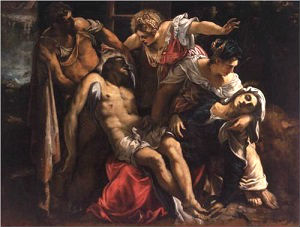
De Pietà door Tintoretto uit 1559
De Amerikaanse dichter, vertaler en etymoloog John Anthony Ciardi werd geboren op 24 juni 1916 in Boston. Zie ook alle tags voor John Ciardi op dit blog.
Most Like An Arch This Marriage
Most like an arch—an entrance which upholds
and shores the stone-crush up the air like lace.
Mass made idea, and idea held in place.
A lock in time. Inside half-heaven unfolds.
Most like an arch—two weaknesses that lean
into a strength. Two fallings become firm.
Two joined abeyances become a term
naming the fact that teaches fact to mean.
Not quite that? Not much less. World as it is,
what’s strong and separate falters. All I do
at piling stone on stone apart from you
is roofless around nothing. Till we kiss
I am no more than upright and unset.
It is by falling in and in we make
the all-bearing point, for one another’s sake,
in faultless failing, raised by our own weight.
The Catalpa
The catalpa’s white week is ending there
in its corner of my yard. It has its arms full
of its own flowering now, but the least air
spills off a petal and a breeze lets fall
whole coronations. There is not much more
of what this is. Is every gladness quick?
That tree’s a nuisance, really. Long before
the summer’s out, its beans, long as a stick,
will start to shed. And every year one limb
cracks without falling off and hangs there dead
till I get up and risk my neck to trim
what it knows how to lose but not to shed.
I keep it only for this one white pass.
The end of June’s its garden; July, its Fall;
all else, the world remembering what it was
in the seven days of its visible miracle.
What should I keep if averages were all?
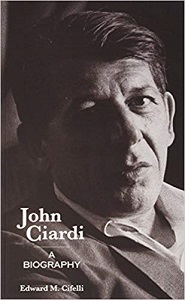
Cover biografie
De Amerikaanse schrijver Scott Oden werd geboren op 24 juni 1967 in Columbus, Indiana. Zie ook alle tags voor Scott Oden op dit blog.
Uit: A Gathering of Ravens
“No place where your Nailed God is welcome,” Grimnir said. “So watch your tongue, little fool.”
Étaín nodded, her eyes wide with fear.
Grimnir led them to the water’s edge, to where someone had drawn a slender punt up on shore. Étaín looked dubiously at the flat-bottomed boat. It seemed as old as the forest, its boards black and shiny with use and decay. A pole lay next to it.
“Get in,” Grimnir said.
“We shouldn’t be here,” Étaín replied, backing away from the water. “This place is… wrong. It’s evil. I can feel it.”
“Evil, eh? What do you know about evil? Get in the boat. We’re close, now.”
Étaín shook her head, her trembling hands clasped before her. Something inimical to her lived among these trees, something unnatural whose hatred and malevolence warped the bosom of the earth itself. That island…
“Get in the gods-be-damned boat, little fool!” roared Grimnir. The echo of his voice profaned the silence. Boughs rustled on a phantom wind; Étaín imagined she could hear spectral laughter, as though whatever dwelled here took great pleasure in her terror. She backpedaled. She was on the verge of fleeing from this cursed grove when Grimnir sprang.
Étaín screamed. She had the impression of lips skinning back from yellowed fangs and eyes blazing like coals an instant before his fist hammered into the side of her jaw and sent her sprawling into oblivion.”
Étaín woke by a fire — a great, roaring blaze that filled the glade with warmth and light. She lay with her back against a fallen log, her hands bound behind her. A dull ache radiated from her bruised jaw. Her ears rang, yet. She blinked, looked around, and tried to remember how she’d gotten here — wherever here was.
What she’d taken for a glade was actually a bight in the living palisade of trees that girt the small island, a grassy cove dominated by a stone-curbed fire pit. It was fully dark, now, but Étaín could still see the black lake beyond, its surface gleaming like a sheet of dark ice. It was snowing; fat flakes hissed and died in the crackling flames rising from the pit.”
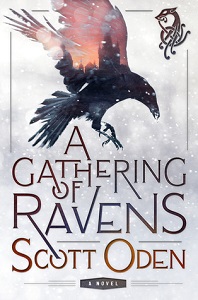
Cover
Zie voor nog meer schrijvers van de 24e juni ook mijn vorige blog van vandaag.

